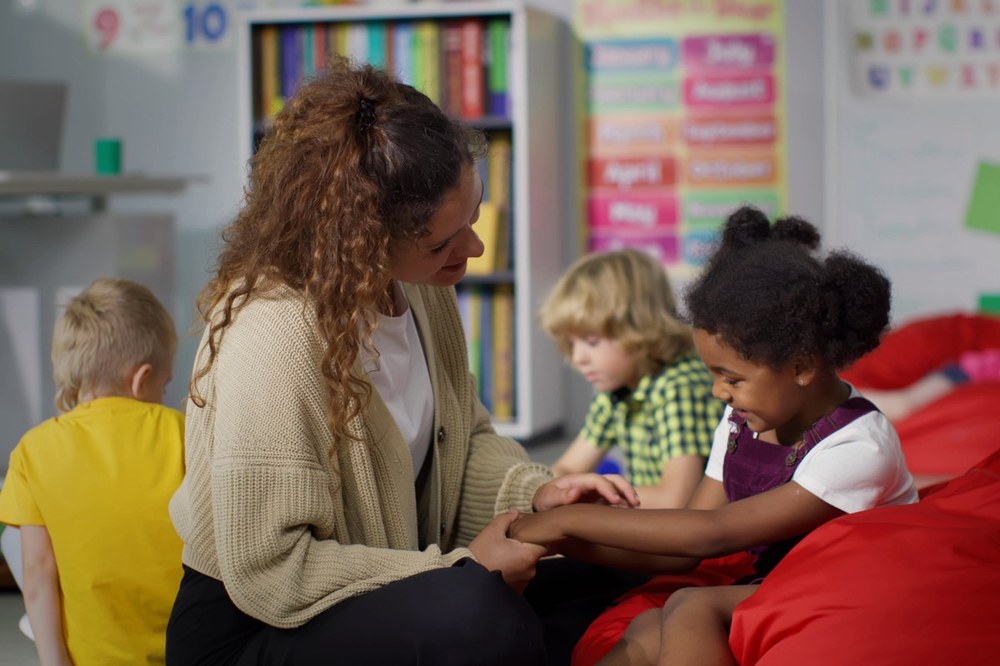Posted: March 10, 2025
"In emotionally supportive classrooms, teachers foster a climate of respect and communication, thus fostering positive relationships. They limit punitive and negative behaviors while being aware, responsive, and comforting toward children's needs" (Paschall et al., 2023, pg. 3).

Teacher cheering and calming upset student in a classroom
Many teachers have experienced it: a 4-year-old in your classroom refuses to stop playing and clean-up, or a 3-year-old may grab another child's toy. Young children are quick to show their feelings and not very good at hiding or controlling their big emotions or emotional responses. These big emotions may lead to actions and behaviors that can be challenging and frustrating for an educator.
Early care and education professionals are uniquely positioned to support children in learning about, expressing, and managing their emotions and behaviors. It takes time for young children to learn and develop these skills. It also takes calm and caring educators to provide a nurturing and safe environment for children to learn these essential social and emotional skills.
Help children learn about emotions.
Devote time daily and throughout the day to build children's emotional understanding. For example, model emotion talk, point out what emotions look like in different situations across the day, teach about specific emotions, and acknowledge children's feelings. Children who understand what they feel and what others may feel can better form relationships, develop self-control, and figure out challenges.
Respond to children rather than react.
When educators respond to children's emotions and behavior rather than react, they offer a positive model to children. Adults who acknowledge children's feelings show children they are cared for, heard, and understood. When adults react to children by, for example, yelling, ignoring real distress, making assumptions about a child, or immediately initiating punitive consequences, they model behavior that does not support children and that erodes children's skill development, trust, and feelings of security.
Support co-regulation.
Co-regulation is a process through which adults support children's self-regulation and emotional development through caring, reciprocal, and responsive interactions. Educators support co-regulation by teaching, modeling, coaching, and offering children opportunities to learn and practice self-regulation and emotion skills. Through co-regulation, educators support children's ability to navigate more challenging regulatory needs as they grow. For example, a child who builds and internalizes emotion regulation and self-regulation skills in preschool is more likely to manage the social and academic demands of school as they grow and develop.
Model and teach problem-solving.
The ability to problem-solve is critical for lifelong growth and learning. Educators support this social-emotional skill when they teach and model multiple ways to problem-solve daily challenges. For example, an educator reading with children says, "It looks like both the frog and duck want to play with the same toy. How do you think they could solve their problem?" Developing problem-solving skills contributes to young children's ability to negotiate play, address challenges in productive ways, and provides a platform to support children's agency related to their feelings and actions.
Focus on sharing and caring behavior to build peer relationships.
When educators notice, respond to, and focus on sharing and caring behaviors with all children, they support a positive platform for children to grow relationships with peers. For example, offer opportunities for children to help each other, share, and connect through their play experiences. Children with positive peer relationships experience fewer conflicts and can better problem-solve when conflicts arise. Educators who nurture an environment for children to develop positive peer relationships focus on ways for all children to grow and shine!
Reference
Paschall, K. W., Barnett, M. A., Mastergeorge, A. M., Li, X., & Vasquez, M. B. (2023). A new look at teacher interactional quality: Profiles of individual teacher–child relationship and classroom teaching quality among Head Start students. Early Education and Development, 34(5), 1172-1190

